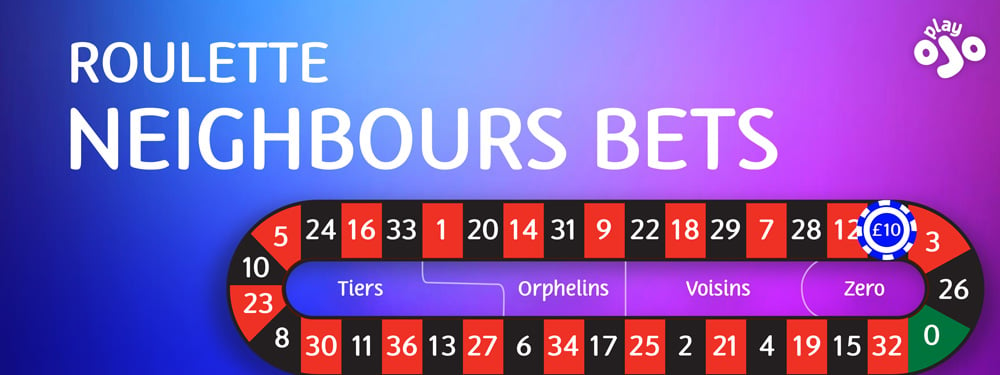
If you want to play roulette like experienced players, roulette neighbours bets are a great place to start. Using this special category of bets, you’ll be able to cover a section of the wheel in European or French roulette with just one chip.
I’m going to show you how they work, how to place these bets and why, in roulette, you should always be friendly with your neighbours!
What is a neighbours bet?
A roulette neighbour bet is one that includes a specific single number as well as the 2 numbers either side of it – in other words the numbers that live next door! This enables you to cover a 5-number section of the wheel, simply by picking the middle number. You’ll find neighbours bets around the edge of the racetrack on most European and French roulette tables.
Neighbours fall into the category of sector bets that are often referred to as ‘called’ or ‘announced’ bets because in a high street casino, only the croupier can place them for you, so you need to call out your bet.
Although neighbours bets in roulette are favoured by experienced players, they’re actually very simple. I see them as a shortcut to making 5 straight-up bets without having to actually place each chip individually.
Let’s see a typical neighbours bet in action…
Example roulette neighbours bet
If we walked up to a European roulette table and asked the croupier for “14 and the neighbours, by five (£5)”, this is the bet we’d be making:

Usually it would involve handing over a £25 casino chip to the croupier, who would place it on number 14 on the racetrack. This gives us a £5 bet on each of the following numbers: 1, 20, 14, 31 and 9. If the ball lands in any of our numbers, we get 35 to 1 on a £5 bet. We win £175 and get our £5 stake back, but lose the other 4 bets totally £20. We have staked £25 and got £180 back, which gives us a profit of £155.
Roulette neighbours rules
Very few recreational roulette players even know neighbours bets exist, let alone how they work, because they’re hidden away from the main roulette table, where the focus is on the more famous inside and outside bets.
In order to play neighbours, you need to understand where they live, which numbers you can play, how much it costs and how to win.
How many neighbours can we choose?
Neighbours bets involve numbers in the order they appear on the wheel, not the roulette table grid. The most common type of neighbours bet – and usually the default setting when you play online – is a 5-number section of the wheel.
You can choose any number on the roulette wheel as the central bet of your 5-number section, and you’ll also cover 2 numbers on both sides of it.
Some online roulette tables allow you to choose how many neighbours you want to play, from 1 number either side to 9!
In the roulette game below, we have bet 14 and 9 neighbours for a 20p unit stake! Remember, it’s 9 neighbours either side, so we have covered 19 numbers, essentially half of the wheel.

How much does a neighbours bet cost?
Your total stake for a neighbours bet is divided by the amount of numbers it involves. If the table minimum for a single number is £1, a typical neighbours bet will set you back £5.
The amount you want to bet must be easily divisible by the numbers you want to play. If you asked a croupier in a real casino for a £10 bet on Black 13 and 1 neighbour, they would ask you to change your stake, as you can’t divide £10 into three straight-up bets.
It’s usually easier to think of neighbours bets as a group of straight-ups bets. Decide how much you want to bet on each number, multiply your bet by the numbers you want to play, and you have your total bet size.
Neighbours odds, payouts and house edge
As roulette neighbour bets only involve straight-up bets on single numbers, the most important roulette odds to know are the chances of hitting a single number, and the payout.
In European and French roulette, there are 37 numbers on the roulette wheel, so each number has a 1 in 37 chance of success. The payouts odds for a single number are 35 to 1, because of the 2.70% house edge.
Now let’s go under the hood of a classic neighbours bet:
Total stake: 5 units
Total winnings: 36 units
Total profit: 31 units
Probability of success: 5 in 37 = 1 in 7.4
Total payout odds: 6.2 to 1
Apart from the fact that we happen to be betting on 5 numbers in a row on the wheel, this neighbours bet is no different to a player placing a chip on 5 random single numbers.
Each of our numbers has a 1 in 37 chance of hitting and with 5 of them running for us, we have a combined 1 in 7.4 chance (13.5%) of winning. Our reward is a 6.2 to 1 roulette neighbours payout on our total stake. As you can see from the difference between the probability of winning and the amount you win, the house edge is inescapable!
How to play neighbours in roulette
You’ll be used to placing inside and outside bets in the main betting zone on a roulette table. But neighbours bets are treated as special bets with their own betting zone. The key difference between offline and online roulette is who puts the chips down.
Playing neighbours online
Almost every European roulette table has a racetrack section, although it may be shown on a different screen, accessible through an icon or the game menu.
At most American roulette tables and a small minority of European or French roulette tables, you may not find a racetrack at all. No racetrack may mean no roulette table neighbours at all, so you should go find another table.
- Find the racetrack – you may need to tap an icon to bring up the racetrack if it’s not already in view.
- Choose how many neighbours – the default setting is usually 2 neighbours. In the racetrack screen below, you can tap the plus and minus at the top to increase or decrease the neighbours.
- Pick your bet size – tap the chip icon to bring up the stake options.
- Choose a number – Pick any number on the racetrack to be your centre number. We picked Red 14 for a total bet of £5.
- Spin! – Cross your fingers and toes, and get paid 35 to 1 on a single number if it hits.

Placing neighbours bets in a casino
You will probably see a racetrack on most roulette tables in a UK casino, but you can’t bet on it yourself. It is deliberately located next to the croupier, and they are in charge of roulette neighbours bets. Here’s how you’d bet them in a land based casino.
- Get your chips ready – You will need to place your total bet on the table, within reach of the croupier. One of the benefits of a called bet is that you don’t need to have the exact amount to hand.
- Wait for the next betting round to open – As with all roulette bets, you can only place your bets after the last spin has ended and all bets have been settled. Don’t leave it till the last second, as neighbours bets require a bit more planning and communication.
- Call your bet to the croupier – Tell the croupier “[number] and the neighbours” and your bet size. You can either tell them how much you want per number, or in total.
- Place the chips on the table – You will need to place your total bet on the table, within reach of the croupier. Don’t try to hand the chips direct to the croupier, it’s bad roulette etiquette. Don’t worry if you want to bet 5 x £5 but you only have a £100 chip. One of the benefits of a called bet is that you don’t need to have the exact amount to hand. The croupier will place the correct amount on your number and give you any change due.
A word on section bets
The racetrack isn’t just ground zero for roulette neighbours bets. In the middle of the racetrack, you’ll find a special category of roulette bets called section bets. Some purists say these aren’t neighbours bets and they belong somewhere else in our full roulette guide. But I’m not one of them.
To me, they’re clearly part of the same family. The most popular section bet is even called Neighbours of Zero.
The racetrack, an exact replica of the wheel in oval form, is divided into 3 or sometimes 4 sections. If you don’t fancy a particular number and its roulette wheel neighbours, you can just pick one of these preset bets.
Tiers Du Cylindre (“Third of the Wheel’)
All numbers from 27 to 33, covering 12 numbers with 6 x 2-number split bets. Your bet costs 6 units and if any number hits, your bet is paid out at 17 to 1.
Les Voisins Du Zero (“Zero’s Neighbours”)
This 0 neighbours roulette bet is the most popular of its type. Voisins is a 9-chip bet covering the 17 numbers from 22 to 25, on the opposite side of the wheel. This bet is a combination of splits, a street and a corner.
Les Orphelins (“The Orphans”)
The 8 numbers not included in the Tiers and Voisins bets, from 1 to 9, and 6 to 17. The orphelins bet in roulette is an 8-chip bet at some tables (Orphelins en Plein), and a 5-chip bet at the rest (Orphelins en Cheval).
Jeu Zero (“Zero Game”)
A smaller cousin to Voisins which covers 6 numbers from 12 to 15 on the wheel, including zero, 2 neighbours on 1 side and 4 neighbours on the other. It is a 4-chip bet with 3 splits and number 26 straight up.
The advantages of neighbours bets
We’ve seen how neighbours are a little under-the-radar and not normally included in the basics of how to play roulette. But they are actually very easy to play. But what’s the point of neighbours roulette bets? Why do players go for them?
They’re convenient
The main advantage of neighbours is that you can bet on several numbers simply by announcing one bet to the croupier. Lazy man’s roulette!
If you want to cover a small section of the wheel, it’s easier to just ask for a neighbours bet than to check which numbers are nearby and then physically place each bet, usually at opposite ends of the table. At a busy roulette table neighbours bets let you stay above the hustle and bustle too.
They hate near misses
If you’re like me, you probably have a lucky number when you play roulette, even if you sometimes bet on others too. You also know the feeling of despair when the ball lands inches from your number, only to settle in the pocket next door. A classic neighbours bet eliminates that possibility, giving you a little wiggle room either side if the ball lands nearby.
They fancy a slice of the wheel
Some players have a hunch the ball will land in a particular section of the wheel. Maybe they’ve got mystic powers that aren’t quite specific enough, or they think they’ve spotted a pattern in the croupier’s technique. If you feel the ball is destined for a section of the wheel but you can’t narrow down its destination, a neighbours bet is the obvious choice.
Summary
In some respects, neighbours bets are nothing special – they’re just shorthand for multiple straight-up bets. But there’s more to them than just convenience, and many experienced roulette players love using a neighbours system. There’s no edge to be gained, and it’s important to play safely as you are betting on at least 5 numbers every time. But cheering for a particular part of the wheel can be great fun and with more numbers to hit, the variance is lower too.
If you’re a fan of outside bets like red or black, try a neighbours bet with 4 or 5 neighbours, or look for the classic Voisins Du Zero section bet. All of these are another way to cover many numbers and follow a section of the wheel as the ball comes down the track.
FAQs
Neighbours are a collection of straight up bets, each of which pay 35 to 1 on your money. Taken as a whole, a typical 5-number neighbours bet will pay out just over 6 to 1.
Neighbours are perfect for anyone who wants to cover a small section of the wheel. Although these bets are typically used by more experience roulette players in land-based casinos, they’re very easy to learn. If you play online, you can practice them and test a roulette strategy around neighbours betting in roulette for free.
You can find the racetrack-based neighbours bets at most European roulette tables and their French cousins in our live casino. For some reason, you won’t find them at most American roulette tables.
Because they’re essentially just bets on single numbers, each one has a house edge of 2.70%. There’s no avoiding the house edge, even if you choose 5 or more neighbours bets, as the house edge is still 2.70%.

















